All things Lakers, all the time.
Get all the Lakers news you need in Dan Woike's weekly newsletter.
You may occasionally receive promotional content from the Los Angeles Times.
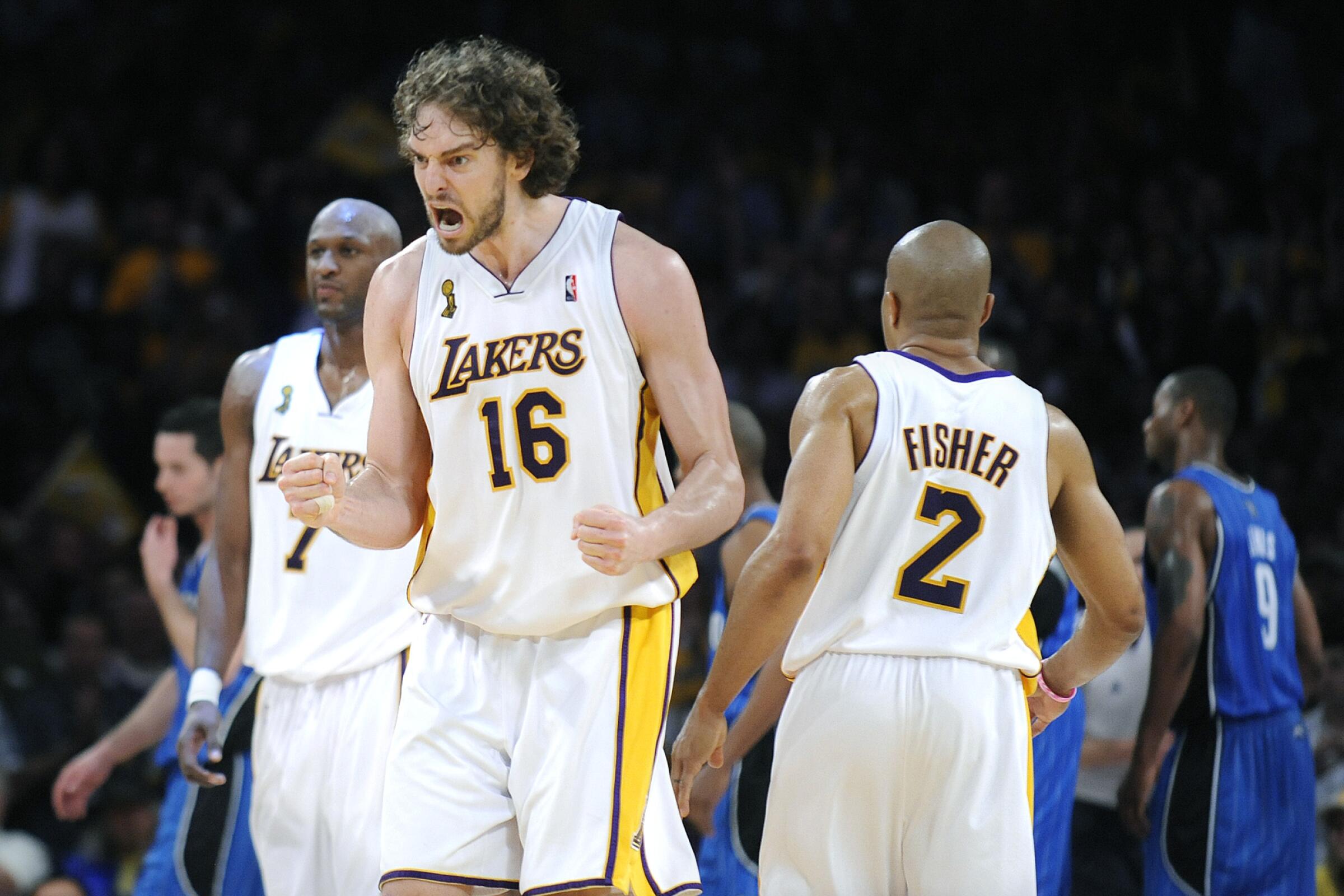
Pau Gasol, who won NBA titles with Kobe Bryant and the Lakers in 2009 and 2010, will be inducted into the Naismith Memorial Basketball Hall of Fame on Saturday.
The 7-foot Spaniard — who joined the Lakers in 2008 in a trade from the Grizzlies that included L.A. sending his brother Marc to Memphis — granted Times reporter Broderick Turner an exclusive one-on-one interview last week.
Here’s a transcript of what they discussed:
“Honestly, it’s a little surreal. It’s hard to picture it still, even though it’s close by. Obviously, it’s a huge honor. I’m still trying to take it in, one day at a time. It’s kind of crazy to think about it, with the [Lakers] jersey retirement being a similar feeling. They are two different things, but I think they are two immense honors. So, pretty humbling, but pretty nice too.”
The Lakers’ deal to acquire Pau Gasol from Memphis changed the path of each franchise, led the Lakers to two NBA titles and landed Gasol in the Hall of Fame.
“I was in Hawaii. That’s when I got the call. That’s when Jerry Colangelo called me, and I got the call and he told me the news. So, it was a pretty great place to take that in.”
“I was with my wife [Catherine McDonnell Gasol] and some of our family and I shared the news, and I shared the news with my family. Obviously, they were in Spain at the time and I told them about the news. They were all very excited and happy for me. But to me, just like my family, as lucky and as fortunate as we have been, we’ve always been happy and proud of each other, of our journey. It’s a very special step of our journey, but it’s still a consequence of everything that we have done together as a family. So, I couldn’t have done or achieved what I’ve achieved without the support, the tools, the values of my parents that they instilled in me growing up, and the support of my brothers. So, yeah, it’s a family accomplishment. It’s really a team accomplishment and it’s a recognition to my teammates, my coaches and everyone that kind of validated me in a special way to get to this honor, to this moment.”
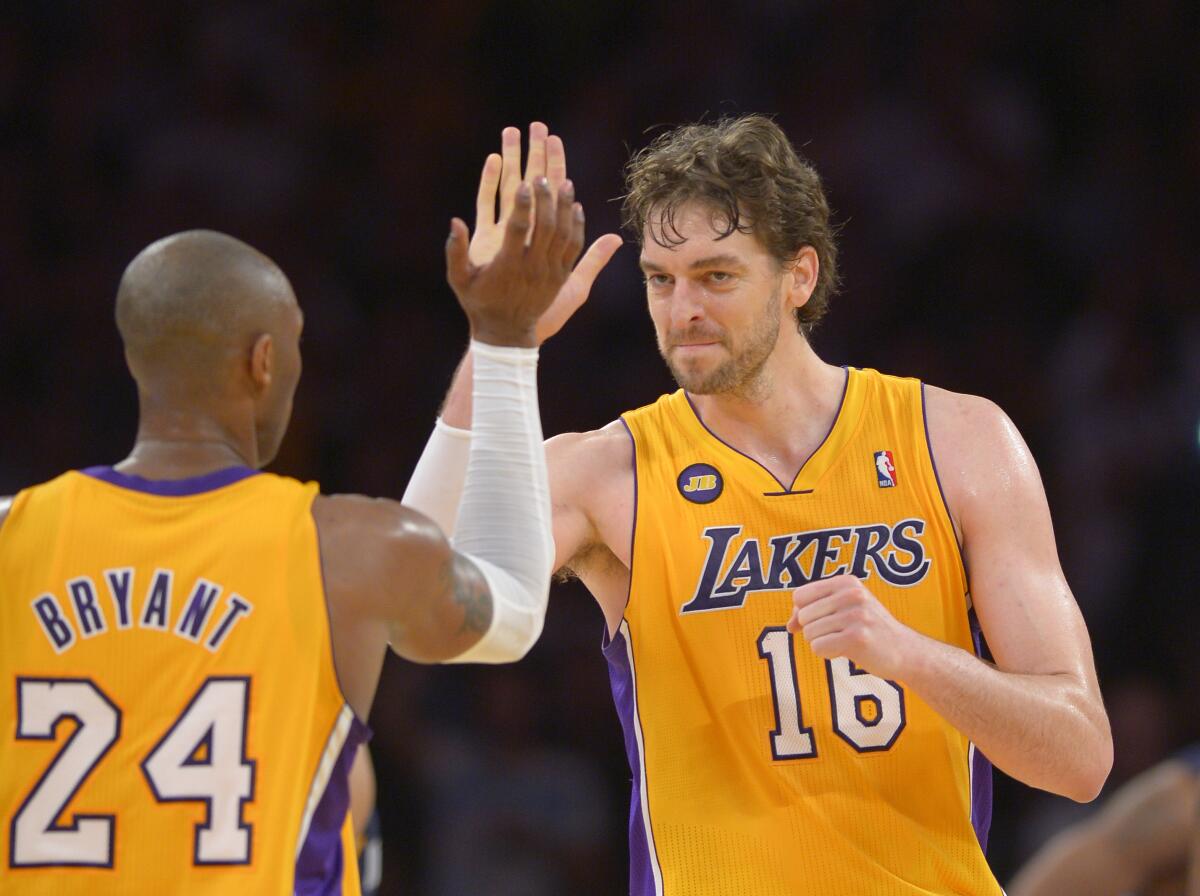
“It’s impossible to really acknowledge that, or have a clue. You don’t start playing basketball, a sport to get to basketball, I don’t know, Basketball Heaven. You play a game that you love. It intrigues you, it excites you, it feels and gives you self-esteem and confidence when you’re a kid. And then little by little, you’re like, ‘Hey, I want to be better. I want to become better. I want to be the best that I can be. I want to play with the best.’ Then Dream Team ’92 comes to Barcelona and they have a tremendous impact and inspire many kids. They definitely inspired me and gave me a vision, gave me a dream, which I kept driving towards until it came true. So, yeah, you see different European players go to the NBA, kind of opening up doors, breaking barriers and then it’s the next wave and things start coming together. Then you take advantage of the opportunity.”
“I guess you have to contribute. … Your career has had to mean something very special and meaningful to the game of basketball in whichever role and position for a long time, let’s say. That’s what I understand. You join a group of people, individual or teams, that have changed the game for the better and they have done something unique and exceptional throughout their careers. So, that’s my understanding.”
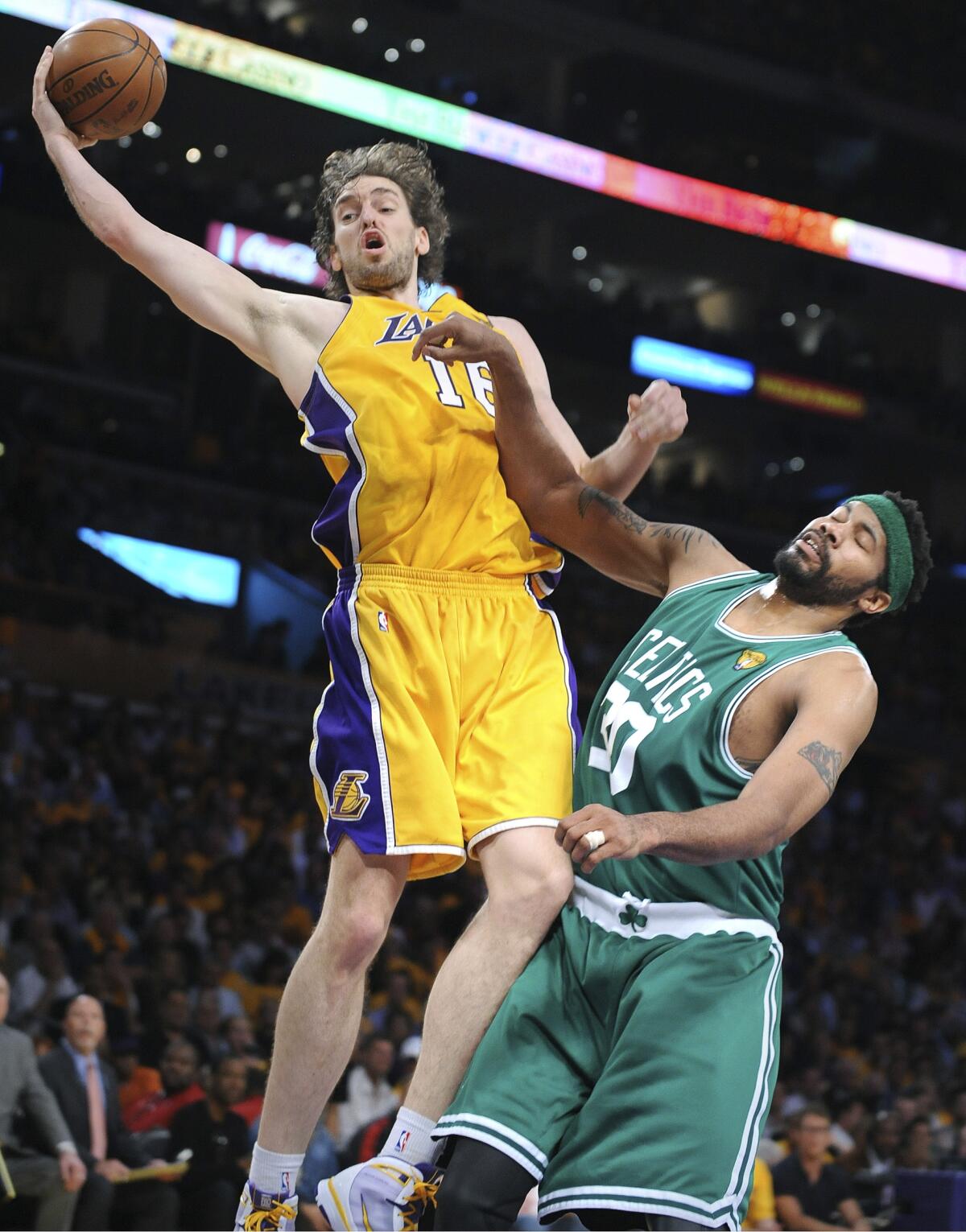
“For most of my country, I think going into the NBA Basketball Hall of Fame it’s something that’s pretty extraordinary, pretty foreign too. It’s like hard to really grasp. What does that mean? Yes, it’s an honor. Yes, it means that you’ve done great. There are other Hall of Fames and stuff: FIBA has a Hall of Fame, which is special. Spain has a Hall of Fame. That’ll be special too. But at that level, the NBA Hall of Fame, it’s hard to really picture and imagine what that means, how big, how important that is. But I think for me, I’ve always felt the support and love and pride of my people, my country, throughout my career. I still feel it today. So, I hope that they feel that this is something that they’ve earned and that they’ve accomplished with me, and they feel like it’s theirs as well. I’ve always had that feeling of pride and responsibility to play for my country, whether it was in the NBA, whether it was international. That has meant a lot to me as a player, it made me work harder, made me approach it in a different way.”
“Growing up, one of my idols was this European player who accepted the honor to be one of my presenters, Toni Kukoc. He was young, fearless, skillful, 6-8. 6-9, 6-10, around that [size]. He was a player that played outside. Even though he was a lefty. … He shot threes. He was very talented and he went to play for the Bulls in the ‘90s, which was obviously the team of the decade, with MJ and Scottie and the rest of the guys. So, Michael was the guy, right, of that time, of the ‘90s that transcended basketball. But then Toni was the European guy, the skinny guy. I was playing small forward until I was 19. I was skinny too. I knew how to dribble the ball, pass, make plays, make some shots. That was it. So, he was a guy that I looked up to growing up. Then obviously you start looking at other players. You start looking at the great power forwards of the game, whether it’s in Europe, whether it’s in the U.S. But Michael and Toni were like the guys that I idolized more.”
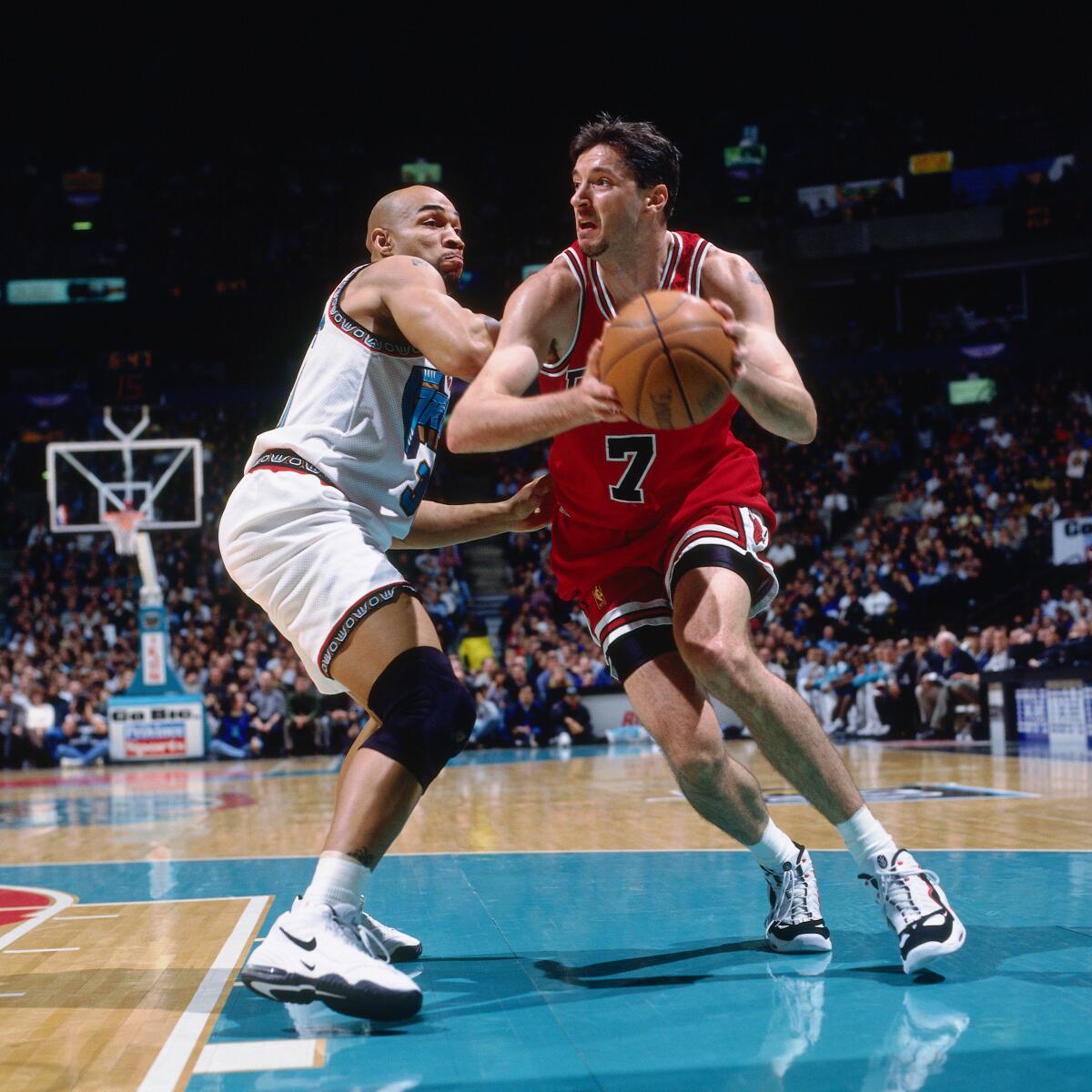
“A critical role, I think a very unique role. He’s definitely one of the players that elevated me like no other. He pushed me to be not just one of the better power forwards in the league, but to become the best out there on a nightly basis during our time and our run together. I was very fortunate to be able to join the Lakers when I did, to have Kob as a teammate, as a mentor, as an older brother. I’m going to miss him tremendously during this day, as I do on a regular basis. But obviously when you get this type of honor, and when a person has played such a big role in you accomplishing it, you would love for him to be there.”
“It’s a blessing. It means the world to me to be able to have such a close relationship, a family really relationship with Vanessa, Natalia, Bianka and Capri and spend time together, be a family really, to be an uncle to those girls, to be a brother to Vanessa. It’s very special. Very special. Something that is dear to my heart, to my family’s heart, as well. Obviously Vanessa is the godmother to our daughter, Elisabet Gianna. That’s forever. That’s forever for me. That’s for life. That true, a unique, type of love that obviously was enhanced through Kobe.”
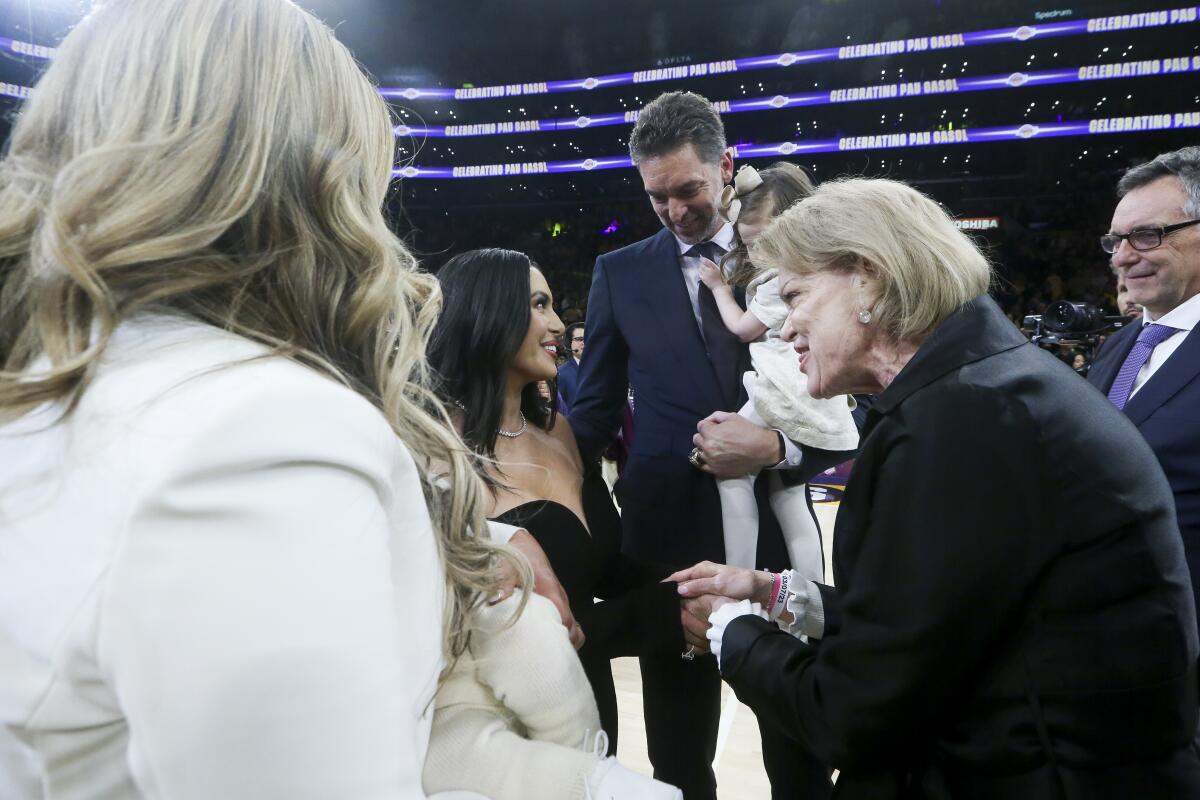
“Everything happened so fast. You have played for a team as long as I did for the Grizzlies; in my case for 6½ years. Then you get the news that you have been traded. Never been traded before. Three hours later or so after they tell me, I’m on a plane to L.A. because I’ve got to get a physical the next morning. So, land in L.A. late, 10 p.m., go to the hotel, try to get some rest, get my physical in the morning and then I get on a 1 p.m., or whatever, flight to Washington, D.C, across the country, because that’s where the team was. I said, ‘OK, let’s go.’ I met the team the next day, but Kobe wanted to see me that same night after I talked to the media in D.C. Kobe obviously gave me the welcome and gave me the message: ‘Happy you’re here, but let’s go win. Let’s go win us a ring.’ That was music to my ears. But obviously he set the tone. He gave me that thing of this is how it’s going to be. It’s not about making the playoffs. It’s not about let’s give ourselves a chance. None of that. ‘We are here and you’re here for us to win a ring, to win a championship. Let’s do it. Have a good night.’ I said, ‘All right, I’m in.’ He got me.
“Then they played the game the next day in D.C. and then I fly to Memphis to pack, because I had nothing. I had to pack my bags and bring them to New Jersey the next day. Got my first practice in the day before the game and started playing and played a few games, played pretty well. Then we had the All-Star weekend and just started to get settled. I just tried to do the best I could, really. Worked hard. Had a pretty significant impact right away. We were able to finish first in the Western Conference. Kobe got the MVP of the season, his only MVP of the regular season, which that obviously gave me a lot of pride because I was able to contribute to that for him and his family. Then we got to the Finals the first season, got to two other Finals after that, won those last two. Very special.”
Pau Gasol, who will become a Hall of Famer this weekend, was asked for his top-10 list of greatest NBA players. He ended up with 11, for good reason.
“It was pretty. I don’t know if I would call it easy, but it was pretty organic and pretty immediate, because they put me in position where I was very comfortable to operate from. Whether it was to make plays for my teammates, and with the spacing and put me in the post most of the time, and then on the elbow some of the time, and then running pick-and-roll with Kob, whether it was on the side or on the top of the floor, it was just bread-and-butter. I understood the game. I had a good basketball IQ and I could recognize my teammates being open. I would look for them and then if they were covered, then I would go to work, which I knew how to do too. But it seemed pretty seamless because to me it was just about the principles of the game, playing the game the right way, with the right spacing, movement with some actions and then it was all about reads and counters, stuff like that, and recognizing what’s there and what’s not there.”
All things Lakers, all the time.
Get all the Lakers news you need in Dan Woike's weekly newsletter.
You may occasionally receive promotional content from the Los Angeles Times.